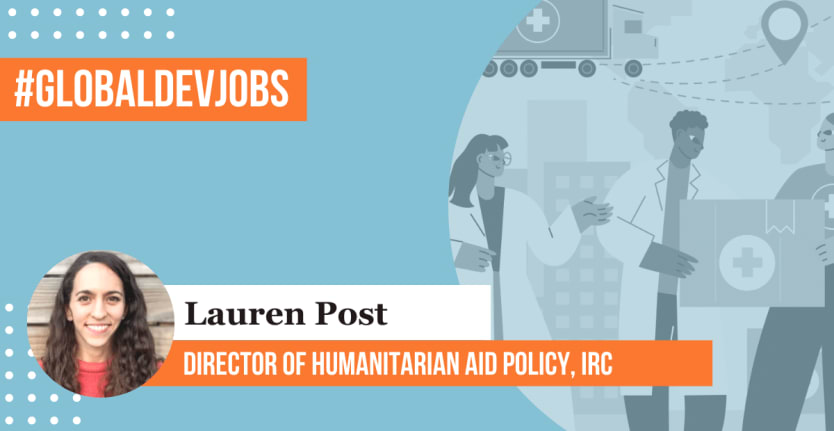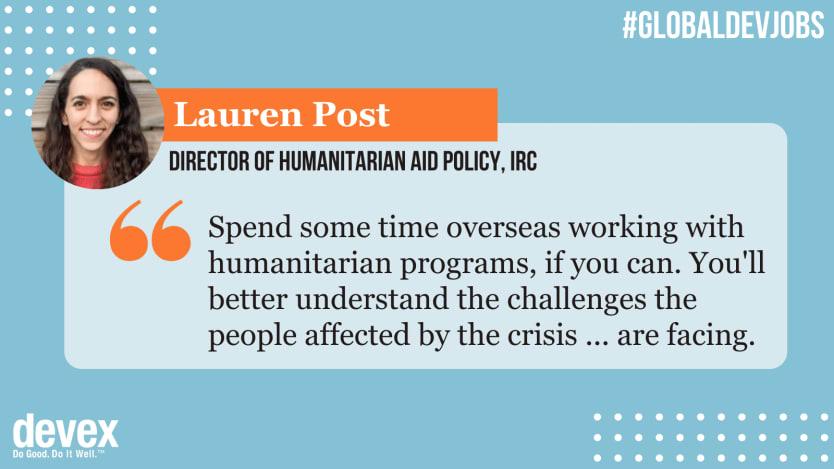
As director of humanitarian aid policy at the International Rescue Committee, Lauren Post leads on strategies to improve humanitarian assistance and ensure aid dollars are spent more efficiently. Her role involves reading to develop deep subject expertise and analyzing policies on, for example, the economy or the impact of sanctions on humanitarian access. She is currently overseeing a new report on how the United States government can improve its response to the COVID-19 pandemic in fragile and conflict-affected states.
Post’s interest in the humanitarian field started with Nicholas Kristof’s coverage of the genocide in Darfur, Sudan. Graduating during the recession however, her career took a detour and she started out working in public relations, an experience that helped hone her writing skills. Still craving a more mission-driven role, she went back to study for a master’s in communications and development at the London School of Economics and Political Science.
Studying as part of a small but extremely diverse cohort allowed Post to learn about different ways of approaching global challenges and the representation of cultures, which has since helped her in building relationships with staffers across the organization and listening to their needs.
This conversation has been edited for length and clarity.
What does your day-to-day look like?
[Both] pre-pandemic and now, [it involves] lots of meetings, lots of analysis, lots of writing. These meetings can be internal meetings within the IRC; I [collaborate] with advocates who work across all of our technical areas. … I also do a lot of [external] meetings and work with other NGOs. There's a lot of coalitions [and] working groups that I am part of where there's a shared or common interest around humanitarian crises and solutions to those. Then there's the really [high-level] meetings with key stakeholders or decision-makers.

On any given day, I might be meeting with representatives from USAID [the U.S. Agency for International Development] or the World Bank or possibly UNHCR [the UN Refugee Agency]. Those are the real moments when we get to advocate with the people who we think can make change.
There's a ton of research and writing to build the evidence base behind our advocacy. Some days, I might be writing a blog, drafting an op-ed, or writing talking points for our CEO. Or I might be analyzing policy, whether that's a bill that's currently on the [Capitol] Hill or a strategy that an institution like the World Bank is putting out, and looking at where we agree [and] where we think improvements can be made.
What skills have you found to be most valuable for progressing in your career?
Writing is probably one of the biggest skills that you really need for this type of work, particularly being able to write differently for different audiences, [whether it’s] an op-ed — sometimes with somebody else's byline on it, so in their voice … a 20-page report, [or] a really compelling two-page memo.
Knowing how to turn complex ideas into simple explanations is really key. We work on big, complex, complicated, messy issues, and I need to be able to write and speak about those eloquently in a compelling way that is going to be understandable to somebody who is less technically knowledgeable on a specific issue. Tied to that is having good critical thinking skills — being able to evaluate and synthesize information and then apply that to solutions.
How do you see the impact of your work?
It's really rare that you see the fruits of your labor immediately in the policy space. Sometimes we're able to see impact in terms of a new policy, or language we've been advocating for ends up in a bill or a strategy. Other times, it takes years.
[For example], since about 2017, we've been encouraging and supporting the World Bank to create a new framework for assessing national refugee policies. In December of this year — so, 2021 — we're finally expecting to see that framework come to life. We're really excited about [this], but the impact of that framework — how it helps move the needle on policies in these countries and then, even further [on], the impact it has on people's daily lives — we're not going to see that for another year or maybe longer.
[Working in] this space takes some patience and persistence.
How has your role changed in the past years?
My role has totally changed based on the political environment, especially in the U.S.
I took this job in 2016, right before the election. … So most of it has been under the [former President Donald] Trump administration, when there was less appetite for aid reform. [At that time], we were more [focused] on trying to ensure that there was simply enough U.S. humanitarian assistance going to places that really needed it, rather than how to change that aid so that it is more efficient and effective.
Under the [President Joe] Biden administration, there's a lot more opportunity [and] some folks in this administration who are really keen to see some of these reforms.
Globaldev careers: The social media lead
Sarah Gilbertz, head of social media at UN Women, talks to Devex about the opportunities for social media professionals to contribute to development organizations.
The last four years, I really spent a lot of time working with and trying to influence international financial institutions, like the World Bank, that had a little bit more of an ear for some of these things and where there was some significant opportunity, given new money coming into refugee contexts. I would say about 80% of my time was probably focused on that. Now it's totally pivoted, and 80% of my time — if not more — is spent on what we're going to try and advocate with the U.S. government.
What advice would you have for other professionals interested in this type of work?
Something that I regretfully didn't do and that I do encourage other people to do … is to spend some time overseas working with humanitarian programs, if you can. You'll better understand the challenges the people affected by the crisis and your colleagues, frankly, are facing and what issues can be unlocked at a local level versus a national level versus an international level to really change and improve people's lives.
I know that's not a reality for everybody, and I'm ... somebody who didn't do that, so I don't think it's a necessity. But I do think that it does help frame your job in a helpful way.
Something that I did … and that I tell people is: Don't be afraid to work in the private sector. There's a lot to gain there. You can learn a lot about the efficiencies of the private sector and a business, better understand the ways the private sector could potentially help in humanitarian contexts in a really meaningful way — rather than just a corporate social responsibility agenda — and get a sense of how the private sector thinks.








